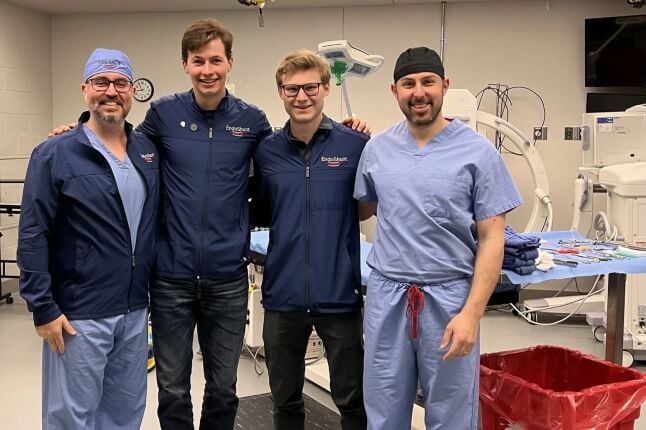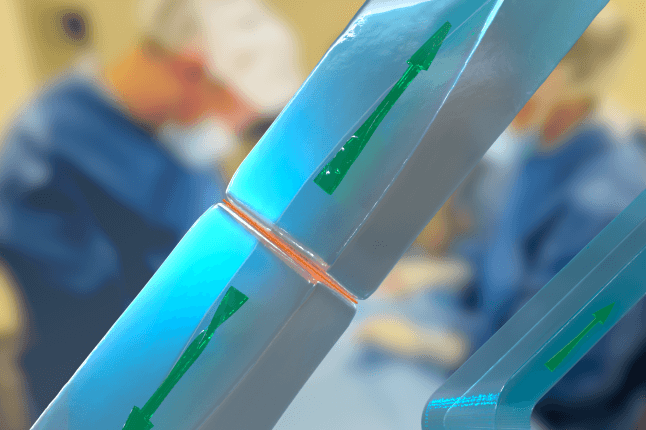News
A robot mimics the folded look of rose petals to grasp complex shapes more easily than a traditional hand. A pneumatic clamp makes it easier for people with motor disabilities to safely wield kitchen knives. Prostheses utilize shape memory polymers to better replicate the range of motion of a limb.
All three of these concepts fall under the category of “soft robotics,” a field that uses strings, magnets, air, water and other non-rigid elements to design robotic solutions for biomechanical or industrial challenges.
The Soft Robotics Toolkit (SRT), developed by the Harvard Biodesign Lab at the Harvard John A. Paulson School of Engineering and Applied Sciences (SEAS), aims to provide a platform for designers, researchers and students to share information and resources in the field. Led by Conor Walsh, Paul A. Maeder Professor of Engineering and Applied Sciences at SEAS, the group recently resumed the SRT Competition, which challenged teams to design, fabricate and present their soft robotic innovations. The competition ran annually from 2015-18, then returned as a virtual showcase this year.
“We have a new team at the SRT, and with that team comes new excitement and eagerness to continue to provide useful and engaging content to our audience,” said Jesse Grupper, a mechanical engineering research fellow in the Harvard Biodesign Lab and member of the SRT team. “We want to continue to benefit our SRT community and felt like now was the time to show that we are still committed and want to continue to see growth in the field.”
Thirty-five teams from around the world competed in Open, College and High School categories of the SRT Competition. Projects were judged based on innovation, implementation, and documentation, with cash prizes awarded to the top designs in each category.
“Sharing these novel projects on our site garners the interest of other researchers, encourages beginners in the field to join the community, and excites members to continue to contribute their own projects,” Grupper said. “Overall, the SRT Competition enables more people to become involved with the community which further pushes the boundaries of the field as a whole.”
ROSE: Torsional Robotic Soft Gripper (Japan Advanced Institute of Science and Technology )
First place in the Open category went to ROSE, a torsional soft robotic gripper designed at the Japan Advanced Institute of Science and Technology. The funnel-shaped gripper folds around and encompasses objects, enabling the soft membrane to grasp and hold complex, small or slippery objects. The Open runner-up prize went to a team from Northeastern University, which designed a series of pneumatically actuated origami robots that can support the weight of a human being.
Dual-Mode Soft Robotics for Enhancing Kitchen Independence for Fine Motor Disabilities (Barker College in Hornsby, Australia)
In the College category, a team from Barker College in Australia designed a pair of soft grippers for use in the kitchen. When actuated, the devices hold or clamp vegetables in place, making it easier for a person with motor challenges to chop or cut them. Runner-up went to a soft robotic hand designed at the University of Illinois at Urbana-Champaign.
4D Prosthetic (Quarry Lane School)
A team from Quarry Lane School in California won the High School category with its 4D Prosthetic. The device uses shape memory polymers to simulate complex motions such as fingers gripping an object. The polymers hold their shape until exposed to heat such as a hot water bath, at which point they can be reshaped into a new position.
“The SRT Team has undergone a lot of changes in the last five years,” Grupper said. “While our staff has shifted, and some of our objectives have changed, we've always been dedicated to expanding the field, and fostering an inclusive space for those that want to join our community.”
Topics: Bioengineering, Materials Science & Mechanical Engineering, Robotics
Cutting-edge science delivered direct to your inbox.
Join the Harvard SEAS mailing list.
Press Contact
Matt Goisman | mgoisman@g.harvard.edu


